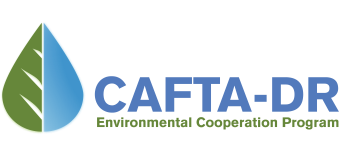CAFTA-DR Environmental Cooperation Program
In February 2005, Costa Rica, the Dominican Republic, El Salvador, Guatemala, Honduras, Nicaragua and the United States (the CAFTA-DR countries) signed an Environmental Cooperation Agreement (ECA). In it, they acknowledged that economic development, social development and environmental protection are interdependent, mutually-reinforcing factors in achieving sustainable development for the well-being of present and future generations. The CAFTA-DR countries (or Parties) developed the ECA in concert with Chapter 17 (Environment) of the Dominican Republic-Central America-United States Free Trade Agreement (CAFTA-DR). In Chapter 17, the Parties commit to expanding their cooperative relationship, recognizing that cooperation is important for achieving their shared environmental goals and objectives and that strengthening their cooperative relationship on environmental matters can enhance environmental protection in their territories and may encourage increased trade and investment in environmental goods and services.
Since then, the CAFTA-DR countries have evolved a program of cooperative action to advance their common development goals by building the capacities of government and civil society, including non-governmental organizations, the private sector and the general public, to protect, improve and conserve the environment.
Focusing on four thematic areas, the Environmental Cooperation Program carries out numerous activities, reaching thousands of people across broad and varied geographical and social spectrums.
CAFTA-DR is the first free trade agreement between the United States and a group of smaller developing economies. This agreement is creating new economic opportunities by eliminating tariffs, opening markets, reducing barriers to services, promoting transparency, and establishing state-of-the-art rules for 21st century commerce. It is facilitating trade and investment among the parties and furthering regional integration.
Central America and the Dominican Republic represent the third largest U.S. export market in Latin America, behind Mexico and Brazil.

Program Information
The Environmental Cooperation Agreement (ECA) sets out the framework for developing, implementing and evaluating an environmental cooperation program under the supervision of an Environmental Cooperation Commission (ECC), composed of government representatives from the relevant ministry or department of each party. Designated representatives from those ministries or departments serve as general Points of Contact (POCs) for cooperative work under the ECA.
In terms of areas and modalities of operation, the ECA emphasizes capacity building; development of voluntary mechanisms, such as partnerships, market-based initiatives and economic incentives; adoption of best practices; and exchange of information.
Chapter 17 refers to the ECA in several places including in Article 17.9 and Annex 17.9, which identifies priorities for environmental cooperation activities.

CAFTA-DR Environmental Chapter
In CAFTA-DR Chapter 17, Environment, the CAFTA-DR countries agree to ensure that their laws and policies provide for and encourage high levels of environmental protection, to continue to improve those laws and policies and to not fail to effectively enforce them.
Environmental Affairs Council
The Environmental Affairs Council (EAC), comprised of cabinet-level or equivalent government officials, meets annually to oversee implementation of and review progress under CAFTA-DR Chapter 17, and to consider the status of cooperation activities developed under the Environmental Cooperation Agreement.
Unless otherwise agreed, each EAC meeting includes a session in which members have an opportunity to meet with the public to discuss matters relating to the implementation of CAFTA-DR environmental component.
Environmental Cooperation Commission
The Environmental Cooperation Agreement provides for an Environmental Cooperation Commission (ECC), consisting of high-level representatives from the relevant ministries or departments of each CAFTA-DR country, to supervise the development, implementation and evaluation of the CAFTA-DR Environmental Cooperation Program.
Designated representatives from those ministries or departments serve as general Points of Contact (POCs) for cooperative work under the ECA.
Secretariat for Environmental Matters
The Secretariat for Environmental Matters (SEM) considers public submissions on environmental law enforcement. Created under CAFTA-DR and operating under the sole direction and supervision of the Environmental Affairs Council (EAC), the SEM consists of a General Coordinator and his/her Technical Assistant, both of whom are appointed by the EAC for a two-year term, and other professional staff deemed appropriate by the EAC. More information on the SEM process may be found on its website.

